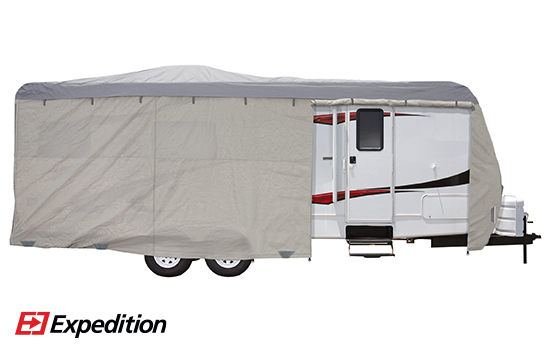views
The Smart Guide to Choosing The Right Camper Caravan Covers
If you own a camper, you already know it’s more than just a vehicle. It’s your escape when city life gets too loud, your little home when you’re parked under the stars, and the keeper of countless memories. The problem is that most campers spend a lot more time parked than traveling. When they are parked in an open environment, they are directly exposed to dust, rain, and harsh sunlight.

That’s why a camper caravan cover is not an accessory; it’s a must-have. The right cover keeps your camper in good shape for the next big trip. The tricky part is figuring out which camper caravan cover is right for you. Let’s walk through it to get the best tips to choose the ideal cover.
Why Covers Are More Important Than You May Think
Nature gets in if you don't cover your camper. Rubber seals become brittle, and paint fades in the sun. You won't notice the damage until it becomes costly, as rainwater gathers on the roof, seeps through cracks, and gradually causes damage. Tree sap leaves stains that are difficult to remove, dust accumulates in every crevice, and mice have been known to move in when the environment is comfortable enough.
An excellent camper trailer cover serves a similar purpose to a protective garment. It will ensure that your camper is ready when you are, but it won't prevent you from utilizing it.
How to Choose the Best Camper Caravan Covers
There are a lot of options when it comes to choosing camper caravan covers. Every option claims to have "the best," leaving you to question which one would actually work for you. It's important to match protection to your actual camper usage, not to chase technical jargon when selecting a cover. Here is a useful summary:
1. Right Material Matters
The backbone of a good cover is its fabric. Multi-layer polypropylene or polyester fabric provides breathability, resilience, and strength. Although a tarp may prevent rain, it retains moisture like a plastic bag. When you take your camper out the following season, it will be fresh rather than musty since permeable materials allow moisture to escape.
2. Protection From UV Rays
If you store your camper outside in summer, UV rays are your biggest enemy. They fade paint, crack decals, and dry out seals until they crumble. Covers with UV stabilizers act like sunscreen for your camper. If you live in sunny states like Arizona, Nevada, or Texas, this feature isn’t optional; it’s survival.
3. Water Resistance vs. Waterproof (Know the Difference)
It’s tempting to go for “waterproof,” but here’s the catch: waterproof fabrics don’t breathe. They lock moisture inside, which is worse than the rain outside. What you want is a water-resistant fabric designed to shed rain while allowing air circulation. Think of it as a raincoat that still lets your camper “breathe.”
4. Ventilation is The Secret Hero
Ever peeled back a cover in spring only to be greeted by a musty smell? That’s poor ventilation at work. The best travel trailer covers have strategically placed vents. They reduce condensation, prevent mildew, and even stop the cover from ballooning in the wind like a parachute.
5. Convenience Features That Save Your Sanity
This is where the little details make a big difference:
- Zippered Panels: Consider needing to get your coffee maker from inside the trailer in the middle of winter. It's a nightmare to take off the entire cover without zipper access. With zippers, all you have to do is unzip, get in, and go.
- Straps & Buckles: If the covers fly off at the first wind gust, they are not worth anything. Straps that can be adjusted keep everything tight.
- Reinforced Corners: Sharp edges, ladders, mirrors, and awnings are known for ripping through fabric. Double-stitched corners or padding reduce the need for repairs.
6. Size & Fit
It is better to take the measurements of your camper's height, width, and length, then compare the results to the sizing table provided by the manufacturer. A loose fit causes the cover to flap in the wind, and fluttering causes tears. You may find the cost of custom-fit covers a little higher, but they will fit your camper perfectly and remain in place in every weather.

7. Think About Your Climate & Lifestyle
Finally, ask yourself: How do I actually use my camper?
- If you camp often and only need short-term storage, a universal cover might be enough.
- If you’re tucking it away for six months of winter, invest in a heavy-duty, custom-fit RV cover that’s built for long battles with snow and wind.
- If you live somewhere humid, ventilation is most important. If you’re in a dry, sunny area, UV protection should be non-negotiable.
The Bottom Line
Investing in a camper is a significant financial commitment that may be safeguarded for many years with the correct coverage. The important thing is to match the RV cover to your environment and storage habits, whether you choose a universal travel trailer cover or a custom-fit one. A decent cover is like having peace of mind. Knowing that your camper is safe will allow you to pack up and go when the time comes, saving you time and trouble.



Comments
0 comment